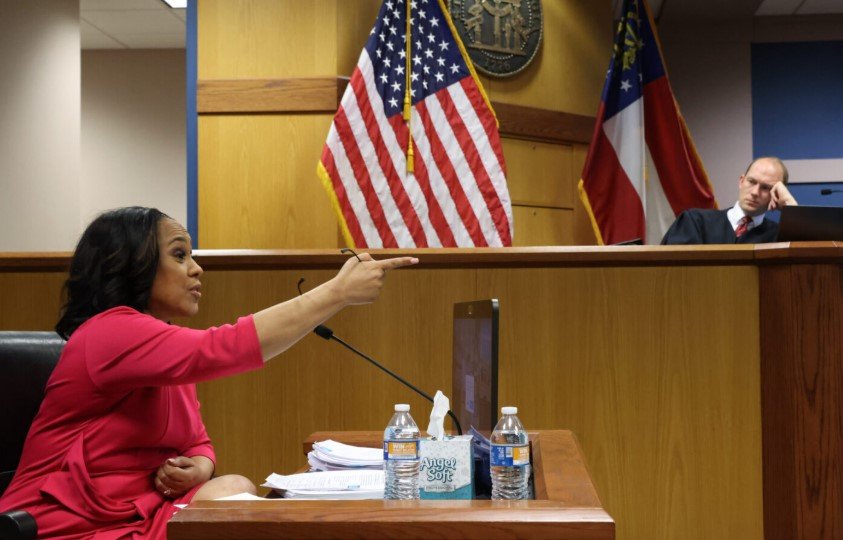Georgia Republicans are gearing up for a heated Senate primary in 2026, with tensions rising between former President Donald Trump and Governor Brian Kemp over candidate choices. The race to challenge Democratic Senator Jon Ossoff features Kemp backed Derek Dooley against Trump leaning Representatives Mike Collins and Buddy Carter, setting the stage for a costly battle in this key swing state.
Key Players Shape the Primary Battle
The primary has drawn big names with deep ties to party leaders. Derek Dooley, a former college football coach turned attorney, jumped in with Kemp’s strong endorsement, tapping into the governor’s popularity among state Republicans.
Mike Collins, a current U.S. Representative known for his vocal support of Trump, has surged in early polls and fundraising. Buddy Carter, another sitting Representative, positions himself as a reliable conservative with experience in Congress.

This three way contest stems from Kemp’s choice to skip the race himself, announced in May 2025. His decision opened the door for these candidates, each aiming to unite the party’s base in a state that flipped blue in recent presidential elections.
National Republicans worry the infighting could weaken their shot at flipping the seat. Ossoff won narrowly in 2021, and Georgia remains a top target for the GOP as they defend their Senate majority.
Polling Data Shows Tight Competition
Recent surveys highlight Mike Collins as the frontrunner, but the race stays fluid with many voters undecided. A poll from late October 2025 shows Collins leading, yet Dooley has gained ground since summer.
Here is a breakdown of the latest head to head matchups from a key survey:
| Matchup | Collins Support | Opponent Support | Undecided |
|---|---|---|---|
| Collins vs. Carter | 38% | 23% | 39% |
| Collins vs. Dooley | 42% | 24% | 34% |
| Carter vs. Dooley | 33% | 28% | 38% |
These numbers suggest Collins holds an edge, especially against Dooley, but undecided voters could swing results as campaigns ramp up.
Dooley’s rise from single digits in earlier polls marks progress, fueled by Kemp’s backing and his outsider appeal as a non politician. Carter, with his longer tenure in Washington, appeals to voters seeking experience but trails in direct comparisons.
Fundraising Fuels the Fire
Money talks in this expensive race, with candidates raking in millions to build war chests. Both Collins and Dooley reported nearly two million dollars each in third quarter hauls, showing strong donor interest.
Carter has spent heavily on ads, topping three million dollars so far, yet his polling lags. This spending spree underscores Georgia’s status as a high stakes battleground, where races often cost tens of millions.
Experts note that Trump’s potential endorsement could unlock more funds for his preferred pick, much like in other states where his nod boosted candidates. Without it, the primary might drag on, draining resources needed for the general election against Ossoff.
The fundraising edge helps Collins maintain visibility through targeted ads and events, while Dooley’s Kemp ties open doors to state level donors wary of Trump aligned figures.
Trump and Kemp Rift Adds Drama
Old grudges between Trump and Kemp spice up the contest. Trump has criticized Kemp since the 2020 election, and his team expressed frustration over Kemp picking Dooley without consulting them.
Public statements and leaked calls reveal Kemp urging donors to back Dooley over the congressmen, framing him as the best bet to beat Ossoff. Trump allies see this as a direct challenge, potentially splitting the party.
This divide echoes past Georgia races, like the 2022 gubernatorial primary where Kemp beat a Trump backed challenger. Observers say Trump’s involvement could unify or fracture the base further.
Key factors influencing the rift include:
- Trump’s push for loyalists in key races nationwide.
- Kemp’s focus on electability in a purple state.
- Historical tensions from election certification disputes.
As the primary nears, both sides maneuver for advantage, with Trump possibly weighing in soon to tip the scales.
What It Means for 2026 Elections
The Georgia primary could signal broader GOP trends heading into 2026. With Republicans holding a slim Senate majority, avoiding messy primaries is crucial, yet this one bucks the trend.
Ossoff, the incumbent, benefits from any Republican discord, building his own campaign on issues like economic growth and voting rights. Georgia’s shifting demographics, with growing suburban and urban voters, make it a must win for Democrats too.
Analysts predict heavy national spending, rivaling the record breaking 2020 and 2021 Senate runoffs. The winner will face Ossoff in a contest that tests party unity and voter turnout strategies.
Broader implications extend to other battlegrounds like Michigan and North Carolina, where Trump has already picked favorites to streamline paths to victory.
If the primary turns bitter, it might echo the 2022 Walker Ossoff rematch, where internal fights hurt Republicans. Party leaders hope for a quick resolution to focus on flipping the seat.
Challenges and Strategies Ahead
Candidates face hurdles like name recognition and appealing to diverse Republican factions. Dooley, as a newcomer, must prove his political chops beyond coaching fame.
Collins leverages social media savvy and Trump loyalty to energize the base, while Carter emphasizes policy wins in energy and health care.
Strategies include:
- Targeting rural voters with conservative messaging.
- Courting suburban moderates wary of extremes.
- Using digital campaigns to reach young conservatives.
With filing deadlines approaching in 2026, expect more endorsements and ads to shape opinions. The race tests if Kemp’s influence or Trump’s endorsement carries more weight in today’s GOP.
What do you think about the Georgia Senate primary? Share your thoughts in the comments and spread the word to keep the conversation going.
